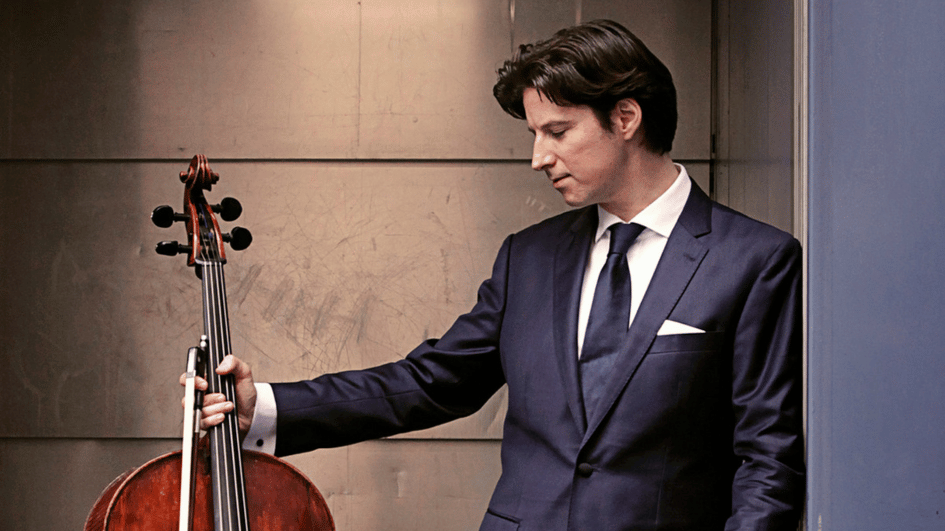
Daniel Müller-Schott, one of the most sought-after cellists in the world who has played on all the great international concert stages, will be the guest of the Istanbul State Symphony Orchestra under the baton of Alessandro Cedrone on Jan. 26 at the Atatürk Cultural Center (AKM) Türk Telekom Opera Hall.
Described by The New York Times as a “fearless player with outstanding technique,” Müller-Schott is an ambassador for classical music, who guests with leading international orchestras.
In addition to performances of the great cello concertos, Müller-Schott has a special interest in discovering unknown works and extending the cello repertoire, for example with his own adaptations and through cooperation with contemporary composers.
Ahead of his upcoming concert on Jan. 26 with the Istanbul State Symphony Orchestra, the musician answered questions.
Q: What was your first musical experience?
A: My first musical experience, it is hard to say because I grew up with music. Music was always in the house. My mother played the harpsicord, the piano and of course listened to music. We had many musical friends who were rehearsing in our house. So, there was a lot of baroque and chamber music. These were my first musical experiences since I was born.
Q: Which composers or works stand out in your repertoire? Which composers do you particularly enjoy working with?
A: There are plenty of composers who have written works for me. The young Finnish composer Oli Mustonen is fantastic. He wrote a cello sonata for me. And I worked with Peter Ruzicka, Sir André Previn and Jörg Widmann. I always enjoy when something new is written. This is for me like learning a new language like I would learn Turkish or an Asian Language. So, it's a new way to express yourself. And I think, composers who stand out in my repertoire are Bach, Beethoven and Brahms. I also love the Russian repertoire Prokofiev, Shostakovich, Tchaikovsky, and of course Dvorak is also a key work in our repertoire since it's the most popular cello concerto.
Q: You have performed with many famous orchestras in different parts of the world. What are your favorite concert memories?
A: The first time with the New York Philharmonic, with the Chicago Symphony Orchestra or with the Berlin Philharmonic… Musicians even come up to you after the rehearsal to rehearse certain passages like from the Dvorak Concerto or the Shostakovich concerto. This is fantastic because you get a sense of unity and friendship which is so important in music making. So, this has happened with the Berlin Philharmonic when I played with them the first time. Then Emmanuel Pahud, the first flute player came up and we rehearsed together. I met Albrecht Mayer, the oboist and Andreas Ottensamer, the clarinet player. And together with the conductor for example Alain Gilbert with the Berlin Philharmonic this was a very rewarding experience.
Q: Can you talk about your passion for discovering unknown or little- known works? What can you say about your collaborations with contemporary composers?
A: I recorded some of the cello repertoire, which is unknown, like Volkmann cello concerto, who is a contemporary of Robert Schumann. And I recorded two concertos by Joachim Raff, a Swiss composer. And this is something that I enjoy a lot next to the cello repertoire, which is quite well known. I also have great enrichment from looking in archives, contemporaries of romantic composers, etc., or baroque composers. And the second thing I like is I do transcriptions of concertos written for other instruments, like the violin mainly, to adapt on the cello. I did many transcriptions there and recorded them. And so, this is what, next to the main repertoire, I enjoy the most.
Q: What about concerts, albums or projects you plan in the near future?
A: I'm happy to come to Türkiye now to collaborate with the wonderful orchestra, with the audience, to get in touch with everyone who is involved in the organization of the Istanbul Orchestra and the musicians, the whole team, which is always very enjoyable. So, I really look forward to that. Then I'm going to France. I'm playing with the Nice Symphony Orchestra. After that, I go to the U.K. and will play the Brahms Double Concerto. I play Schumann's Cello Concerto in Qatar.
Q: How did you find the Ataturk Culture Center’s atmosphere?
A: I played a few times there and I always like to, when I have a new hall, to spend some time myself to get to know the acoustics better. Also, to see how I can connect with, you know, the last row of the hall. Because you want to reach everyone in the audience, and you must try out. My teacher Heinrich Schiff always used to say, you must listen from every corner of the hall, which is very good advice. Because you really must be aware that music has to reach out to everyone in the audience. So, I'm really looking forward to that.